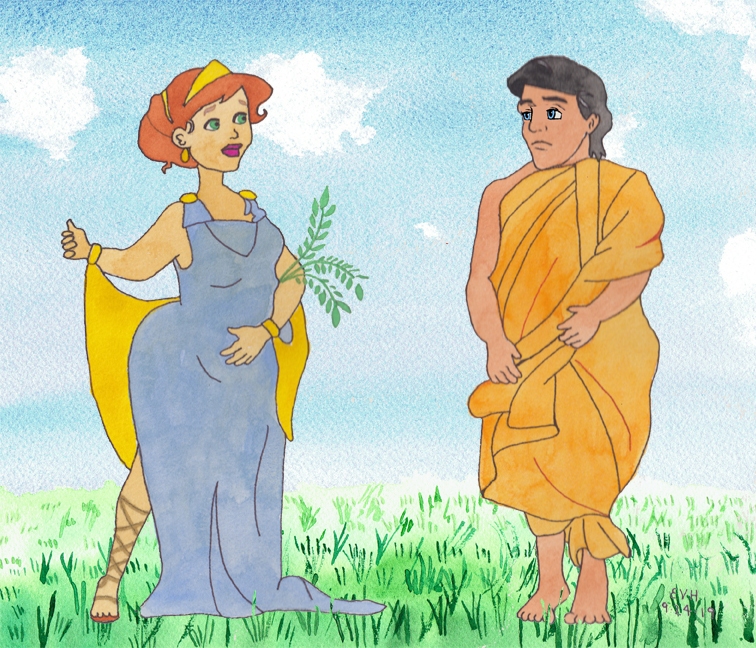
Jataka 167
Samiddhi Jātaka
Prosperity
as told by Eric Van Horn
originally translated by William Henry Denham Rouse, Cambridge University
originally edited by Professor Edward Byles Cowell, Cambridge University
Stories similar to this one show up throughout the Pāli Canon. In this case, an attractive, temptress of a goddess tries to entice a recluse into giving up the holy life, to enjoy the pleasures of a sensual life, and then when he is older go back to the holy life. But as the recluse says, we never know the time of our death. We have to treat each moment as precious for it could be our last. We must use every moment to our best advantage so that we can awaken and free ourselves from stress and suffering and the endless and fruitless rounds of rebirth.
“Begging brother, do you know?” The Master told this story while he was staying in Tapoda Park near Rājagaha. It is about the Elder Samiddhi whose name means “prosperity.”
Once the Elder Prosperity had been sitting in deep samadhi (meditative absorption) all night long. At sunrise he bathed, then he stood with his under robe on. He held his outer robe in his hand. As he dried his body, it shined radiant like gold. He was like a golden statue of exquisite workmanship, the perfection of beauty, and that is why he was called “Prosperity.”
A daughter of the gods saw the Elder’s unsurpassed beauty and fell in love with him. She said to him, “You are young, monk, and fresh, a mere stripling. You are blessed with coal black hair. Bless you! You have youth, you are lovely and pleasant to the eyes. Why should a man like you become a monk without a little enjoyment? Take your pleasure first, and then you can lead the holy life and do what the recluses do!”
He replied, “Goddess, at some time or other I must die, and I do not know the time of my death. That time is hidden from me. Therefore in the freshness of my youth I will follow the holy life and put an end to suffering.”
Having received no encouragement, the goddess at once vanished. The Elder went and told his Master what had happened. Then the Master said, “Not only now, Prosperity, are you tempted by a goddess. In past days, as now, goddesses tempted recluses.” And then at his request the Master told a story from the past.
Once upon a time, when Brahmadatta was the King of Benares, the Bodhisatta was born as a brahmin’s son in the village of Kāsi. When he came of age, he attained perfection in all his studies, and then he embraced the holy life. He lived in the Himalayas near a natural lake. There he cultivated the Five Faculties (1) faith, 2) energy, 3) mindfulness, 4) concentration, and 5) wisdom) and the Attainments (jhānas).
All night long he sat in deep samadhi. At sunrise he bathed and with one bark garment on and another in his hand, he stood, letting the water dry from his body. At that moment a daughter of the gods observed his perfect beauty and fell in love with him. Tempting him, she repeated this first stanza:
“Begging brother, do you know
What of joy the world can show?
Now’s the time - there is no other.
Pleasure first, then - begging brother!”

Figure: The Goddess and the Handsome Recluse
The Bodhisatta listened to the goddess’s address and then replied. Declaring his purpose, he repeated the second stanza:
“The time is hid - I cannot know
When is the time that I must go.
Now is the time; there is no other.
So I am now a begging brother.”
When the goddess heard the Bodhisatta’s words, she vanished at once.
After this discourse the Master identified the birth: “The goddess is the same in both stories, and I was the recluse at that time.”
